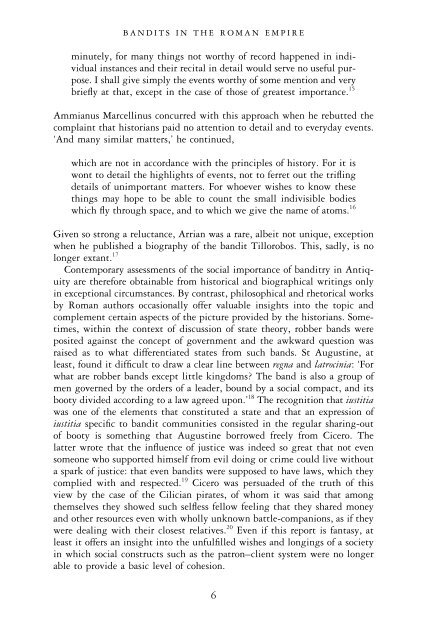You also want an ePaper? Increase the reach of your titles
YUMPU automatically turns print PDFs into web optimized ePapers that Google loves.
BANDITS IN THE ROMAN EMPIRE<br />
minutely, for many things not worthy of record happened in individual<br />
instances and their recital in detail would serve no useful purpose.<br />
I shall give simply the events worthy of some mention and very<br />
briefly at that, except in the case of those of greatest importance. 15<br />
Ammianus Marcellinus concurred with this approach when he rebutted the<br />
complaint that historians paid no attention to detail and to everyday events.<br />
‘And many similar matters,’ he continued,<br />
which are not in accordance with the principles of history. For it is<br />
wont to detail the highlights of events, not to ferret out the trifling<br />
details of unimportant matters. For whoever wishes to know these<br />
things may hope to be able to count the small indivisible bodies<br />
which fly through space, and to which we give the name of atoms. 16<br />
Given so strong a reluctance, Arrian was a rare, albeit not unique, exception<br />
when he published a biography of the bandit Tillorobos. This, sadly, is no<br />
longer extant. 17<br />
Contemporary assessments of the social importance of banditry in Antiquity<br />
are therefore obtainable from historical and biographical writings only<br />
in exceptional circumstances. By contrast, philosophical and rhetorical works<br />
by Roman authors occasionally offer valuable insights into the topic and<br />
complement certain aspects of the picture provided by the historians. Sometimes,<br />
within the context of discussion of state theory, robber bands were<br />
posited against the concept of government and the awkward question was<br />
raised as to what differentiated states from such bands. St Augustine, at<br />
least, found it difficult to draw a clear line between regna and latrocinia: ‘For<br />
what are robber bands except little kingdoms? The band is also a group of<br />
men governed by the orders of a leader, bound by a social compact, and its<br />
booty divided according to a law agreed upon.’ 18 The recognition that iustitia<br />
was one of the elements that constituted a state and that an expression of<br />
iustitia specific to bandit communities consisted in the regular sharing-out<br />
of booty is something that Augustine borrowed freely from Cicero. The<br />
latter wrote that the influence of justice was indeed so great that not even<br />
someone who supported himself from evil doing or crime could live without<br />
a spark of justice: that even bandits were supposed to have laws, which they<br />
complied with and respected. 19 Cicero was persuaded of the truth of this<br />
view by the case of the Cilician pirates, of whom it was said that among<br />
themselves they showed such selfless fellow feeling that they shared money<br />
and other resources even with wholly unknown battle-companions, as if they<br />
were dealing with their closest relatives. 20 Even if this report is fantasy, at<br />
least it offers an insight into the unfulfilled wishes and longings of a society<br />
in which social constructs such as the patron–client system were no longer<br />
able to provide a basic level of cohesion.<br />
6


